Law
Judge Noel Cannon, the “Miniskirt Judge”
Los Angeles Municipal Court Judge Noel Cannon gained national fame due to her flamboyant fashion style and eccentric habits. She liked to wear babydoll dresses and miniskirts. So she became known as the "miniskirt judge."
Her eccentric habits included decorating her judicial chambers entirely in pink, holding her pet chihuahua on her lap during cases, and keeping a mechanical canary in her chambers whose chirping could be heard during court proceedings.

She reached the peak of her fame in 1967 thanks to a widely published picture of her brandishing a pearl-handled Derringer revolver. She was demonstrating to the press how she would defend herself if attacked.

Her downfall started in 1972 when a police officer pulled up beside her while she was driving and told her she was using her horn excessively. She was, and he was right to tell her so, but he didn't know she was a judge. She cursed him out, drove off, and later ordered him into her court and threatened that if he ever crossed her again she would give him "a .38 caliber vasectomy."
By 1975, the California Supreme Court had removed her from the bench. The incident with the police officer wasn't the only reason. She was also accused of "abusing her contempt power, interfering with the attorney-client relationship by arbitrarily appointing new counsel, interfering with bail and bench warrants, setting unreasonable bail amounts, intimidating defense attorneys, abusing the prerogatives of her high office, engaging in curt and rude conduct, [and] engaging in 'bizarre' behavior."
She subsequently disappeared from public life and died in 1998.
For more details, the Los Angeles Public Library has a two-part article that tracks her rise and fall: "Loose Cannon: Reassessing Los Angeles Municipal Judge Noel Cannon" Part 1, Part 2
Posted By: Alex - Mon Feb 10, 2025 -
Comments (4)
Category: Law, Judges, 1960s, 1970s
Brenda Butler Bryant, serial litigator
The article pasted below, from 1994, describes Brenda Butler Bryant's "record-setting litigation." In one year alone she had filed over 700 lawsuits, accounting for 7 percent of the lawsuits filed in the federal courts. Finally a judge ordered her to stop, stating that her handwritten complaints were "frivolous" and "plainly products of a confused, disoriented and unsound mind."Did she stop? Apparently not. She was in Philadelphia then, but more recently she's been living in Georgia and as of last year was still filing complaints. From a Sep 2024 ruling by U.S. District Judge Steven D. Grimberg:
She alleges no facts demonstrating how any named Defendant is liable for the harm she allegedly suffered. She has not identified any specific causes of action. Nor has Bryant supplied any facts that could plausibly support her alleged damages, which range from $1 million per day, to $1 billion, to $1 billion per day. Her pleadings also contain incomprehensible assertions, such as "$=Gift $=Winning no sign=free issuance."...
For example, in Case 1:24-cv-1032-SDG, Bryant names as Defendants the U.S. Department of Health and Human Services (Centers for Disease Control), Wil-Lie Cop-E-Land, and the thieves who stole her coat.
The sheer length of time she's been doing this is kind of impressive.



Philadelphia Inquirer - Nov 16, 1994
Posted By: Alex - Thu Jan 09, 2025 -
Comments (0)
Category: Law, Lawsuits
Unusual Punishments of the Theodosian Code
In 429 AD the Roman emperor Theodosius II established a commission to write down all the laws of the Roman Empire since 312, covering all the Christian emperors. The resulting work was the Codex Theodosianus (or Theodisian Code).In his book The Triumph of Christianity, biblical scholar Bart Ehrman lists some of the more unusual punishments included in the codex:
- Imperial bureaucrats who accepted bribes were to have their hands cut off (Theodosian Code l.16.7)
- ineffective guardians of girls who had been seduced were to have molten lead poured down their throats (Theodosian Code 9.24.1)
- tax collectors who treated women tax delinquents rudely were to "be done to death with exquisite tortures"
- anyone who served as an informer was to be strangled and " the tongue of envy cut off from its roots and plucked out" (Theodosian Code 10.10.2)
- slaves who informed on their masters were to be crucified (Theodosian Code 9.5.1.1)
- anyone guilty of parricide "shall not be subjected to the sword or to fire or to any other customary penalty, but he shall be sewed in a leather sack, and, confined within its deadly closeness, he shall share the companionship of serpents" and then thrown into a river or ocean "so that while still alive he may begin to lose the enjoyment of all the elements" (Theodosian Code 9.15.1)
Posted By: Alex - Fri Dec 13, 2024 -
Comments (2)
Category: Law, Ancient Times
Wrong Corpse, Wrong Decapitation


Posted By: Paul - Sat Nov 02, 2024 -
Comments (4)
Category: Death, Law, Identity Mistakes, Thefts and Mix-ups, Bodies, Corpses, Remnant Parts
Estate Willed by Talkie
Video wills have become quite common, but they weren't back in 1931. So the unnamed testator described below was breaking new ground by creating one (or rather, a filmed will).I particularly like the detail that he left instructions on where everyone should sit while watching the film, so that he could look at each person directly from the grave.
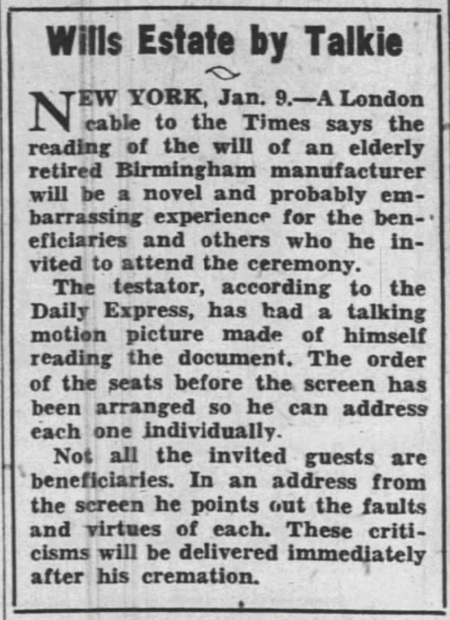
Wichita Eagle - Jan 10, 1931
Posted By: Alex - Sat Mar 30, 2024 -
Comments (0)
Category: Death, Inheritance and Wills, Law, Movies, 1930s
Is it marijuana or alfalfa?
Peter Hlookoff had an unusual strategy to avoid being convicted for possession of marijuana — he always carried a container of alfalfa with him.His reasoning was that alfalfa and marijuana smell similar (so he claimed). So if the police ever arrested him for possession of marijuana he could claim that it was actually alfalfa they had smelled (or seen him smoking).
This strategy was put to the test in Dec 1967 when the police raided his apartment and arrested him for smoking pot. During the subsequent court case his defense led to the magistrate arranging for a court employee to smoke marijuana so that its smell could be compared to alfalfa.
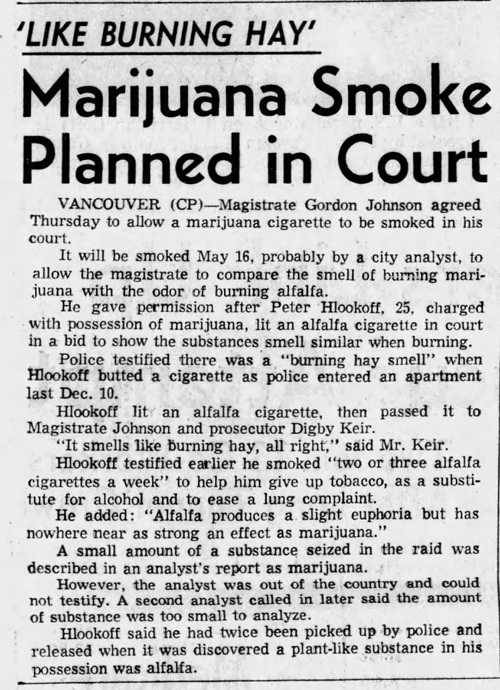
Victoria Times Colonist - May 10, 1968
Unfortunately the courtroom experiment was cancelled before it took place, and the magistrate ended up finding Hlookoff guilty. He didn't buy Hlookoff's follow-up argument that if, perhaps, it had been marijuana he was smoking then someone must have (without his knowledge) put marijuana in his alfalfa container.
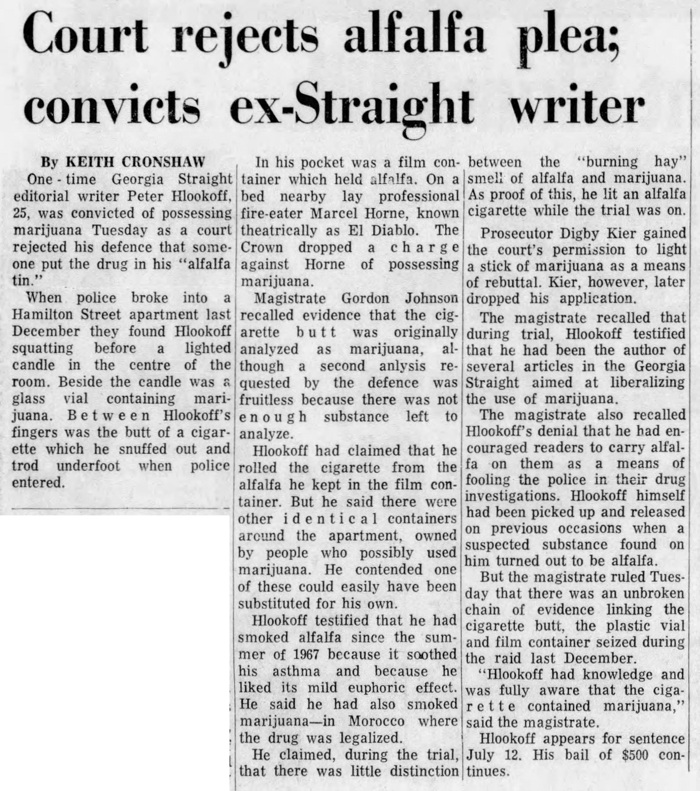
The Vancouver Province - July 3, 1968
Hlookoff's roommate, Marcel Horne (a professional firebreather whose stage name was 'El Diablo'), later wrote an autobiography in which he revealed that, yeah, they were absolutely smoking pot when the police raided their apartment:
We were rapping away very stoned, when we heard someone coming up the stairs. The next thing we knew two cops in uniform walked into the room. Peter tried to drop the roach but the cop saw him. I was too stoned to think properly so I just lay there watching the nightmare. The cops put us up against the wall and frisked us. "Who does the marijuana belong to?" We both answered, "What marijuana?"
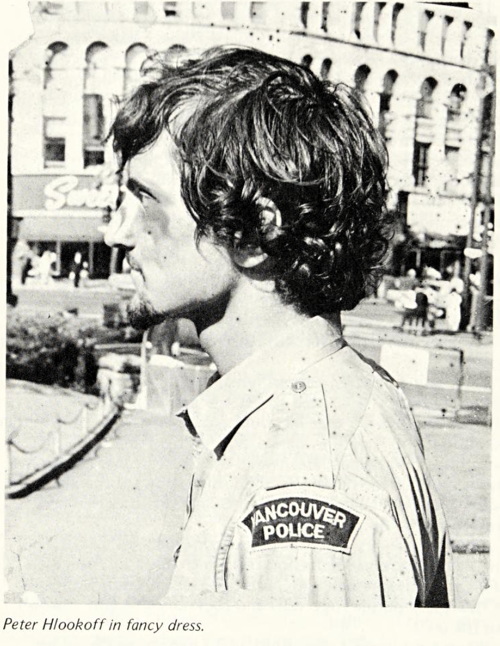
image source: Annals of the Firebreather (1973), by Marcel Horne
Posted By: Alex - Wed Mar 27, 2024 -
Comments (2)
Category: Drugs, Smoking and Tobacco, Law, 1960s
Working on Sunday
The UK's Shops Act made it illegal to operate a shop on Sunday... unless one was Jewish (since the Jewish observed the sabbath on Saturday). So business owner Mike Robertson figured that to open his stores on Sunday he simply had to make his staff convert to Judaism.The Shops Act had other oddities. According to the London Telegraph, a shop could stay open if it was "in an officially designated 'holiday resort area'" or if it restricted sales to "certain kinds of perishable goods, like fruit, flowers and vegetables; medical and surgical appliances, newspapers, cigarettes and refreshments."
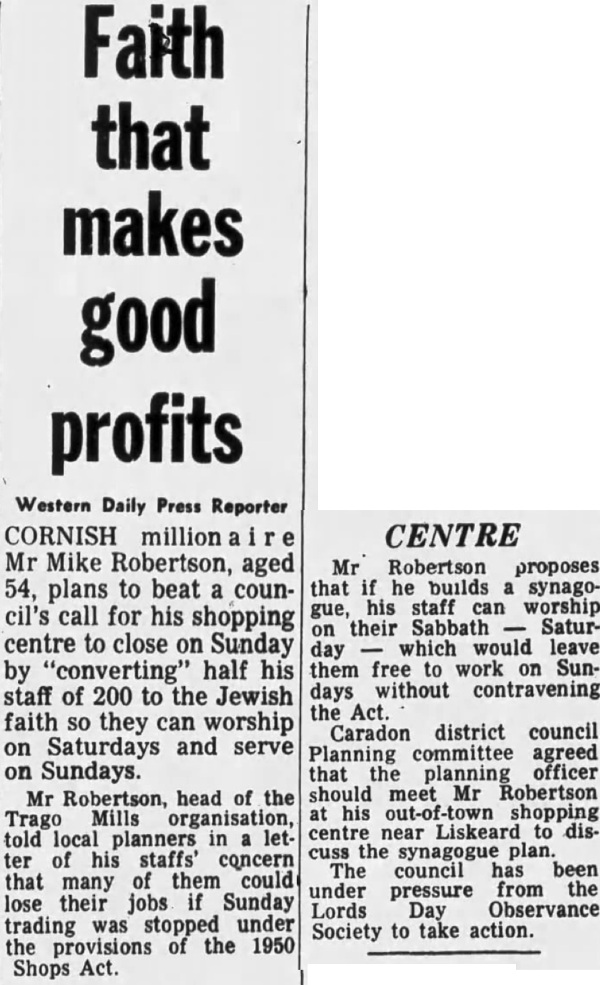
Bristol Western Daily Press - Mar 8, 1977
Posted By: Alex - Fri Mar 22, 2024 -
Comments (2)
Category: Business, Law, Religion, 1970s
The Fifth Dimension Sings “The Declaration of Independence”
Was this the secret origin of SCHOOLHOUSE ROCK?
Posted By: Paul - Mon Feb 26, 2024 -
Comments (0)
Category: Law, Music, Politics, PSA’s, Twentieth Century
Kilty as charged
A case of being guilty of being Kilty.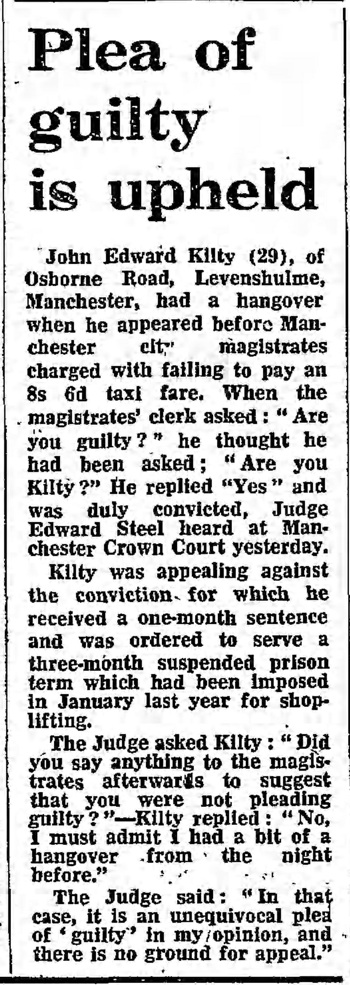
The Guardian - Feb 25, 1969
Posted By: Alex - Sat Feb 10, 2024 -
Comments (0)
Category: Law, Judges, Odd Names, 1960s
The Judge who wanted to be fully informed
Nov 1976: Roxbury District Court Judge Elwood McKenney, presiding over a cocaine possession case, announced that he would need to try cocaine himself before he made his ruling... in order to be able to make an informed decision. He recessed the trial until he had done so.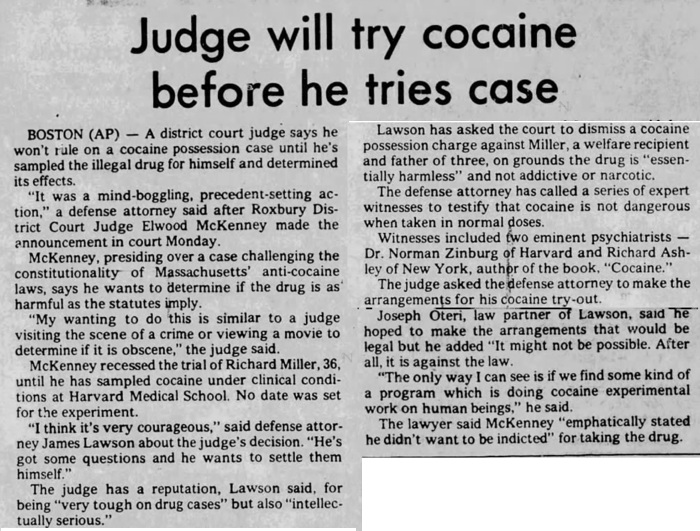
Palo Alto Times - Nov 2, 1976
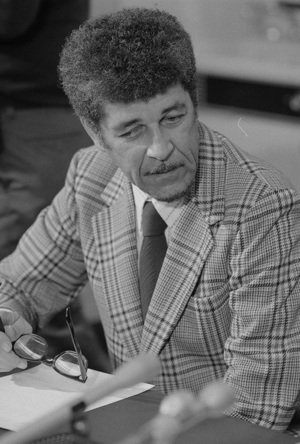
Judge Elwood McKenney
About a month later, McKenney abandoned his decision to try cocaine, saying that all the publicity about it had distorted his intent.
But he then proceeded to rule that the Massachusetts statutes forbidding the possession of cocaine were unconstitutional.
Obviously his ruling must have been dismissed or overturned at some point, otherwise cocaine would now be legal in Massachusetts. But I haven't been able to figure out when that happened.
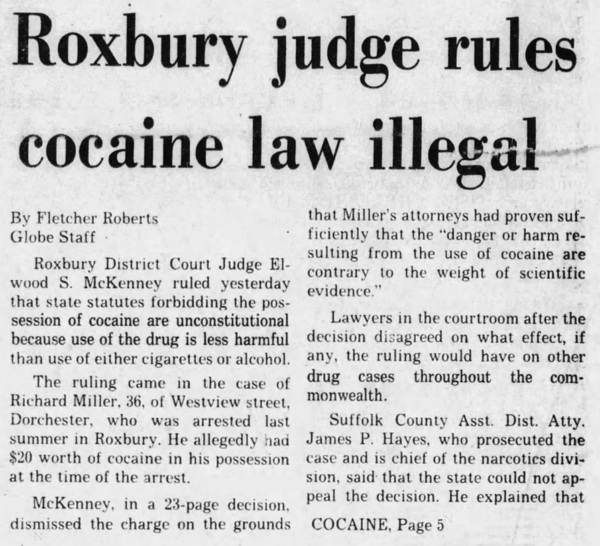
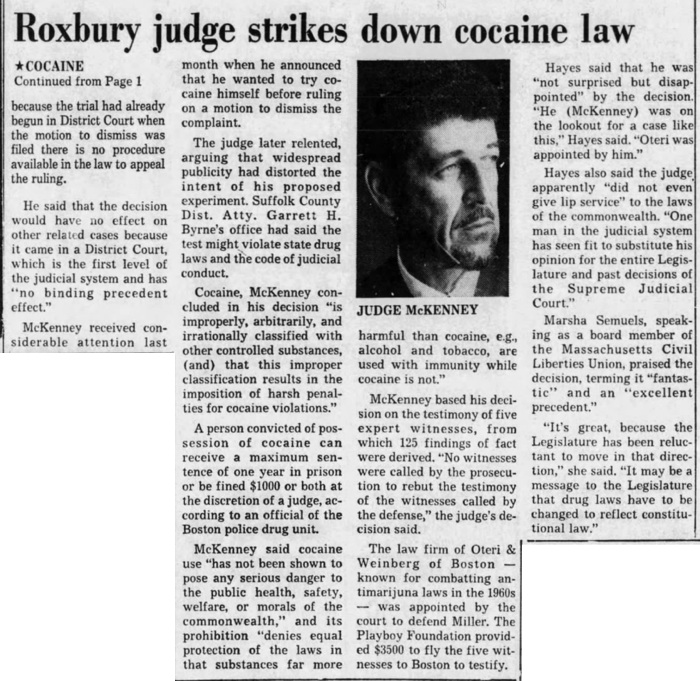
Boston Globe - Dec 11, 1976
Posted By: Alex - Thu Jan 18, 2024 -
Comments (1)
Category: Drugs, Law, Judges, 1970s

| Who We Are |
|---|
| Alex Boese Alex is the creator and curator of the Museum of Hoaxes. He's also the author of various weird, non-fiction, science-themed books such as Elephants on Acid and Psychedelic Apes. Paul Di Filippo Paul has been paid to put weird ideas into fictional form for over thirty years, in his career as a noted science fiction writer. He has recently begun blogging on many curious topics with three fellow writers at The Inferior 4+1. Contact Us |




